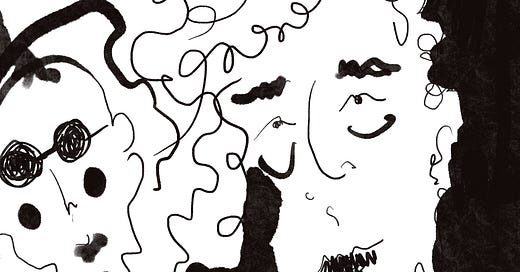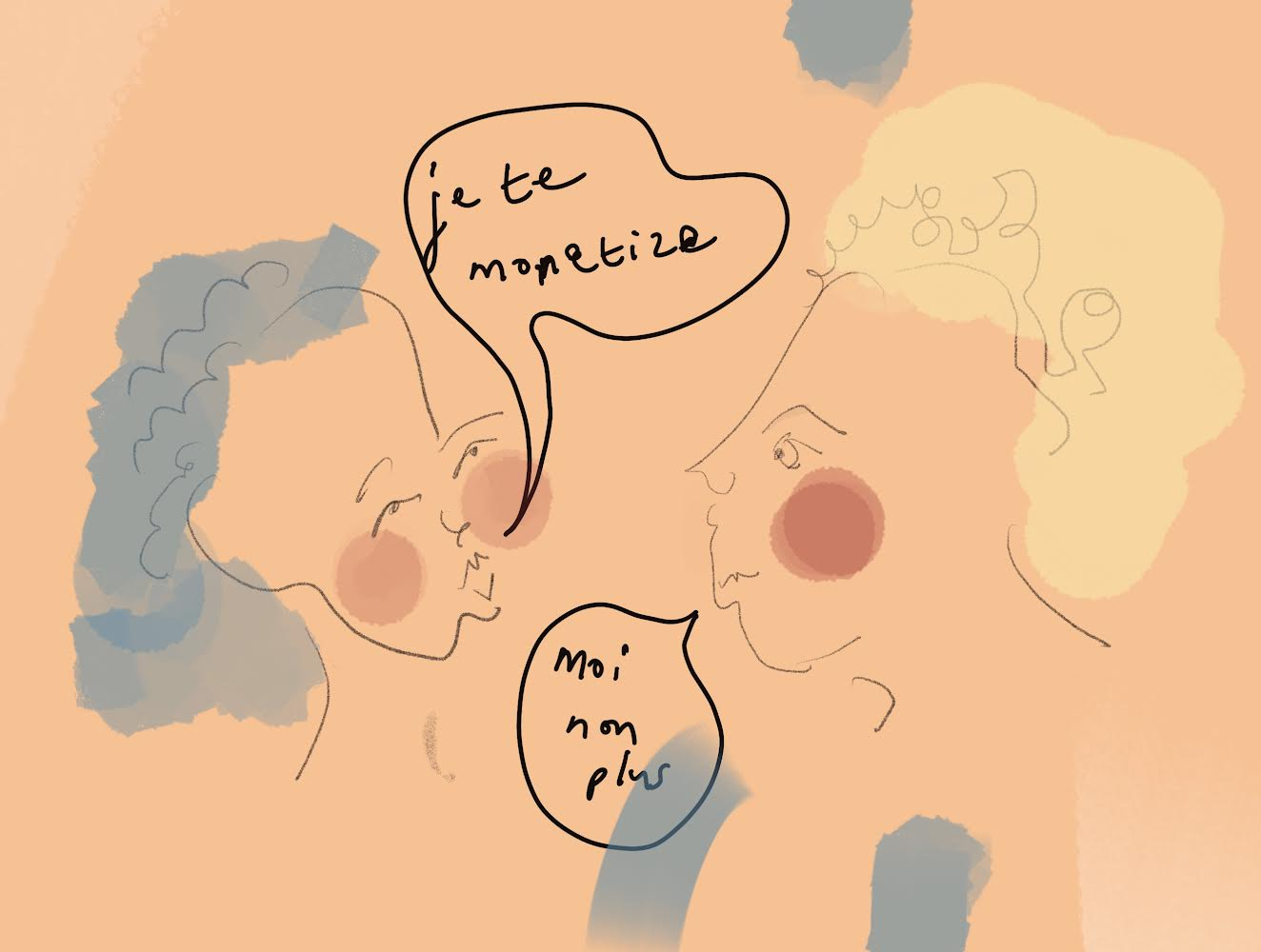Dear Friend,
I hope you’ve had a good couple of weeks.
In my last letter, I wrote about euphemistic British-isms we use e.g. “I’ll just POP to the shop”, instead of ‘go’ to the shop.
Karen from Scotland, a dedicated Pen Friend correspondent, wrote back with this amendment (she is English but now lives, as the earlier epithet suggests, in Scotland):
“So funny to think about our English euphemisms [used] in the attempt to avoid perceived offence from the actual word. I say ‘English’ now as no self-respecting Scot, [Northern] Irish, or Welsh citizen of Great Britain would ever describe themselves as a "Brit ".”
I imagine Karen is right? I always describe myself as “British”, rather than “English”, because it is my nationality, after all — but I think I, like many other people from England, sometimes conflate the use of the two terms. French language/culture certainly makes the distinction. I used to always describe my nationality in French as “britannique”, but it confused people; sometimes they thought I meant I was actually Scottish, Northern Irish or Welsh. So now, for clarity’s sake, I generally say “anglaise”, even if it doesn’t feel quite right either. Occasionally I say I’m “Londonienne”, which probably feels the most accurate.
On the subject of the same archipelago, this weekend I was reunited with Ellen, my former housemate and the forever housemate of my heart, who moved back from Paris to Dublin over four years ago. Ellen and I lived together for two years in a quiet pocket of the 14th arrondissement on the southern edge of the city. It was a truly exemplary living situation, predicated on shared interest and mutual respect, and punctuated by many long evenings spent drinking cheap red wine, eating crisps and talking about important things like love, politics and haircare.
Ellen taught me many things about many things, ranging from how great it is to always have a supply of neatly-folded clean towels and face-cloths, to the particularities of Hiberno-English, or the version of the English language that developed from the imposition of the English (in every sense) on the grammar of the Irish language and the sensibility of Irish people. For example:
There are no direct words for ‘yes’ or ‘no’ in Irish, so you are more likely to re-use the verb in the question someone asks you;
Expressing a feeling by describing something as being ‘on’ you comes from the grammar of Irish; for example: ‘I’ve got a goo on me’ means ‘Oo I feel like going out on the town’ (Ellen — please correct me if I’m wrong. I have been meaning to pester you for a while to write a guest letter about Hiberno-English — hopefully you will indulge me some time soon).
When Ellen and I lived together, we would host quarterly seasonal parties with catchy titles like ‘Winter warmer’, ‘Spring drinks’ etc. We lived on the ground floor and on on one memorable occasion, an inebriated guest spent several minutes saying his goodbyes before leaving, then jumping back into the party two minutes later through our front window. Another time we stood speechless as one friend-of-a-friend’s-cousin wouldn’t leave, and when he finally did, asked if he could take “a bottle for the road”. We always got permission for our parties from ‘Madame’, the building’s elderly Portuguese gardienne. She begrudgingly agreed as long as we made sure guests were quiet in the hallway, and also because she had a soft spot for us both calling us, (un)fittingly, “mes anglaises”.
Anyway, it’s like a homecoming every time I see Ellen. On Friday we met up with a group of assorted friends at L’Apostrophe, a casual bistro in the 11th arrondissement near the canal, where a jazz band was playing. We discussed the film All of Us Strangers starring Irish actors Andrew Scott and Paul Mescal. Having heard it was emotionally intense, and also due to the above-average attractiveness of the two stars, Ellen expressed being unsure if she was able to handle watching it: “Hannah, I’m not sure I CAN!”.
And I knew exactly what she meant. I feel this quite often — a sort of aversion to doing the thing that would bring me the most concentrated joy or fascination. For example, I have a book about a branch of my family history/heritage that I am bound to find riveting, but I can’t bring myself to read it: it’s too much! Or there are certain movies, like Funny Girl with Barbra Streisand, that I delayed watching because I knew I would love everything about it. Sometimes I even get it with writing this letter, a kind of avoidance to do something I find so interesting. I’m not quite sure what it is… it will be TOO much. I will enjoy it too much, it will be too good for me, it will make me feel too alive! Something like that.
(This is a sweet kind of avoidance — quite different to the kind of procrastination that comes with not wanting to call the French tax office, for example).
On Friday evening, Ellen was sitting to my right and my friend Joe — an actual anglais in Paris — was sitting to my left. He is a smart man who at the age of 32 has written TWO novels, which makes him eminently productive in my eyes. However, we were also discussing procrastination. He said how he will quite happily avoid his number-one goal by attacking the number-two goal. We decided the best strategy, therefore, was to create a faux number-one goal as a decoy e.g. ‘starting a new career in investment banking’ or ‘becoming a trail runner’.
Earlier this week, I took a foray into STARDOM, presenting a video about hotels in Paris (I will share it here most likely, although when I watched a clip on playback I seemed to be moving my eyebrows an alarming amount, so I’ll share it subject to my eyebrows staying under control in the final edit.) I really enjoyed the immediacy of presenting: you just have to get on with it and procrastination is not an option. So perhaps this is another trick for achieving my highest goals (along with the decoy plan): do them on camera!
Thirty-second book club
I have been reading Nana by Emile Zola, the fourth of his Rougon-Macquart series that I’ve read now. All the characters from the novel series are tied together, more or less loosely and we follow the same families over generations — like a 19th-century Parisian Eastenders!
In this novel the eponymous Nana, who we first meet as a little girl in earlier novel L’Assomoir, is an 18-year-old prostitute and rising theatre star. The early novel described her conquest of the high-society men of Belle Epoque Paris. Later, she has enough of courting the rich and snobby and declares, “j’en ai marre d’etre chic !” (‘I’ve had enough of being chic!’) and moves back up to Montmartre from the grand boulevards of central Paris. I’m immediately struck by how sexually explicit the novel is compared to the English novels of the same era I’m used to. The Victorian novel is all allusion and suggestion, whereas Zola just comes right out and WRITES WHAT HE MEANS e.g. ‘and then she slept with him’, ‘then she removed her clothes’ etc etc. SHOCKING!
Et voilà ! Thank you for reading this letter about procrastination and avoiding what you love. I’ll write again next week, procrastination permitting!
Please write back, like and share as you see fit!
Yours,
Hannah






Coloc of my heart! A homecoming indeed. ❤️❤️❤️
I so relate to procrastinating about doing things I know I will love! There are some tasks / films that are so perfectly made for me that I feel I can't consume them yet - perhaps because I still get to look forward to them? Really enjoyed learning I'm not the only one! X